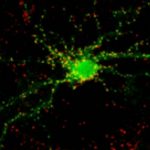Group leaders
- BIOTHERAPIES : Stéphane PALFI : stephane.palfi@aphp.fr
- ENVIRONNEMENTAL : Franck SCHURHOFF, : franck.schurhoff@inserm.fr
- GENOMIC : Stéphane JAMAIN : stephane.jamain@inserm.fr
- IMAGING : Pauline FAVRE et Charles LAIDI : pauline.favre@inserm.fr – charles.laidi@inserm.fr
- IMMUNOPSYCHIATRY : Marion LEBOYER : marion.leboyer@inserm.fr
Access map to the Faculty of Health at Créteil
Access map to the Albert Chenevier Hospital
Team news
 –Congratulations to Marion LEBOYER who wins the Inserm Grand Prix 2021!
–Congratulations to Marion LEBOYER who wins the Inserm Grand Prix 2021!
(December 7, 2021)
 – Immuno-Psychiatry: Facts and prospects, a book published by Springer and authored by Michael Berk, Marion Leboyer and Iris Sommer. This book provides a thorough and critical review of current knowledge about the role of immunology in major psychiatric disorders and its potential applications.
– Immuno-Psychiatry: Facts and prospects, a book published by Springer and authored by Michael Berk, Marion Leboyer and Iris Sommer. This book provides a thorough and critical review of current knowledge about the role of immunology in major psychiatric disorders and its potential applications.
(October 25. 2021)

– Congratulations to Pauline Favre, newly recruited as a research fellow at Inserm in Marion Leboyer’s team!. (October 1, 2021)
 – Congratulations to Ophélia Godin, newly recruited as a researcher at Inserm as part of Marion Leboyer’s team! (December 1, 2020)
– Congratulations to Ophélia Godin, newly recruited as a researcher at Inserm as part of Marion Leboyer’s team! (December 1, 2020)
Team presentation
Psychiatric disorders represent key public health challenges, as they are leading contributors to the global burden of disease and profoundly impact the social and economic well-being of individuals. In the European Union, it is estimated that over 80 million women and men of all ages experience some form of mental disorder, meaning that mental health problems will affect up to 27% of the general population at some point during their lives and the World Bank study predicts that by the year 2020, mental disorders will be the major cause of disability worldwide.
Combining multiple approaches from basic neuroscience to identification of genetic and environmental risk factors, and to brain imaging techniques performed on large cohorts of patients, our team aims at disentangling the pathophysiological processes of major psychiatric disorders and identifying biological markers in order to develop personalized therapeutic strategies (testing innovative molecules, as well as psycho-social treatments and impact of nutrition). We work on major psychiatric disorders, such as bipolar disorder, resistant depression, schizophrenia, autism spectrum disorders, suicidal behaviors and addictions. Closely connected to a large department of psychiatry and addictology in Henri Mondor, Albert Chenevier and Emile Roux hospitals (www.psymondor.aphp.fr) in charge of three catchment areas of Eastern Paris, our laboratory is situated on three different locations:
- the genetic exploration and basic neuroscience research at the school of medicine of Université Paris Est (Hôpital Henri Mondor, Créteil)
- the brain imaging explorations at Neurospin (Centre d’Energie Atomique, Saclay)
- the clinical assessments and data storage at the Albert Chenevier hospital.
Our laboratory also benefits from multiple infrastructures, successfully funded by the French Ministry of Research including:
- – a private foundation : the fondation FondaMental (fondation-fondamental.org),
- – a laboratory of excellence, the labex Bio-Psy (paris-neuroscience.fr/fr/labex-bio-psy-laboratoire-de-psychiatrie-biologique-0),
- – a cohort following 1000 young psychiatric patients (the cohort Psy-COH)
- – a university affiliated department (DHU PePSY).

More about Marion LEBOYER :
Short_biography_Leboyer_12AVRIL 2022
Research projects
Genes and synaptic organization and function
Most of the genetic studies recently conducted on major psychiatric disorders showed the importance of synapses in the aetiopathology of the disease. Based on high-throughput genetic exploration (genome-wide association studies, analysis of copy-number variations, transcriptome analysis, etc.), we recently identified in early-onset form of bipolar disorder, functional mutations in genes involved in synapse formation and function. The aim of this project is to continue the mutation screening in large cohorts of patients with bipolar disorder, schizophrenia or other psychiatric disorder and determine the functional impact of mutations associated with these disorders. This exploration combines a clinical characterization of patients carrying mutations (brain imaging, electroencephalography, emotional hyper-reactivity, etc.), the analysisof molecular organization and synaptic functions in cellular models and the behavioural studies of animal models. In parallel, we continue high-throughput genetic exploration of psychiatric disorder with the aim of identifying biological markers for diagnostic or treatment response.
identified in early-onset form of bipolar disorder, functional mutations in genes involved in synapse formation and function. The aim of this project is to continue the mutation screening in large cohorts of patients with bipolar disorder, schizophrenia or other psychiatric disorder and determine the functional impact of mutations associated with these disorders. This exploration combines a clinical characterization of patients carrying mutations (brain imaging, electroencephalography, emotional hyper-reactivity, etc.), the analysisof molecular organization and synaptic functions in cellular models and the behavioural studies of animal models. In parallel, we continue high-throughput genetic exploration of psychiatric disorder with the aim of identifying biological markers for diagnostic or treatment response.
Immuno-inflammation in major psychiatric disorders
Recent genetic and physiological studies suggest that a large part of major psychiatric disorders such as bipolar disorder and depression, schizophrenia and autism spectrum disorders are the result of dysimmune processes. . This major breakthrough should help discovery of biomarkers and environmental risk factors, description of pathways, and innovative treatments. The model under exploration in our laboratory hypothesize that interaction between early infections and functional immuno-genetic variants associated with psychiatric disorders are responsible for an insufficient anti-infectious response, leading to low grade inflammation that increases the permeability of blood brain and digestive barriers leading to central and peripheral auto-immune abnormalities and to reactivation of endogenous retro-virus.
Along this pathway, we are working on association with infectious stigma, characterization of immuno-genetic background (TLR, NOD, HLA/MHC), identification of peripheral inflammatory markers and their clinical/cognitive correlates, peripheral and central auto-antibodies, abnormal digestive track (microbiota).. On top of exploring new pathways, our aim is to be able to develop relevant biomarkers and to further identify drugs that will counteract this immune activation status.
To develop the field of “Immuno-Psychiatry”, several ongoing projects are funded by Agence Nationale de la Recherche within national collaboration with Ryad Tamouza (hospital St Louis, Paris), Jérome Honnorat (CHU Lyon), Laurent Groc (Institut Magendie, Bordeaux), Nicolas Glaichenhaus (Sofia Antipolis, Nice) as well as international collaboration with the Stanley foundation (J Hopkins, Baltimore, US) or JIPMER (India).
Circadian pathways in major psychiatric disorders
Multiple levels of rhythm abnormalities have been observed in patients with bipolar disorder such as circadian preference for eveningness, seasonality or rapid cycling, while sleep abnormalities have been reported in patients with schizophrenia and autism spectrum disorders. Most of these circadian rhythms and sleep disturbances are underpinned by abnormal function of circadian clocks, and abnormality of melatonin, a neurohormone synthesized during the dark phase of the night. We have identified rare variants and susceptibility SNPs in genes involved in melatonin synthesis and circadian rhythms in patients with autism spectrum disorder, intellectual disability, attention deficit and hyperactivity disorder and bipolar disorders. The aim of this project is to establish correlation between sleep and circadian disturbances along with biomarkers and genetic vulnerability risk factors of clock and melatonin genes. We thus collect data on sleep/wake patterns and circadian rhythms using both questionnaires and actigraphic recording in large samples of cases with bipolar disorder and autism spectrum disorder, their relatives and controls in order to identify sleep/circadian phenotypes that are relevant for association to clock genes. In addition, we analyse sleep/circadian phenotypes to other components of psychiatric disorders (metabolic syndrome, immune abnormalities, emotional reactivity, brain imaging) in order to better understand how abnormalities of the central biological clock influence the expression of these disorders.
Gene x environment interactions
The aetiology of major psychiatric disorders is due to both genetic and environmental factors and their interactions. We focus our efforts on the identification of environmental risk factors, at individual and population level, and on the study of gene x environmental interactions. We have shown the influence of childhood trauma as an individual environmental factor on the risk for bipolar disorder or schizophrenia and have been able to demonstrate the interaction of childhood affective trauma and serotonin transporter gene polymorphisms, or Toll Like Receptors. We also recently demonstrated, that degree of urbanization (a population risk factor) is associated with increased rates of both affective and non-affective psychoses. We are part of a European project (EU-GEI) in which data on environmental risk factors for major psychiatric disorders have been collected to identify environmental and genetic determinants involved in the development, severity and outcome of psychotic disorders as well as affective disorders with psychotic features. We also extend the range of environmental risk factor studied at individual (infections, season of birth, drugs, migration, discrimination etc.) and population level (social capital, disorganization, socio-economic factors etc.) as well as gene x environment analysis through the data collected in the cohort Psy-COH. We also conduct studies investigating the influence of genetic and environmental risk factors on subclinical manifestations of psychosis (i.e. psychometric schizotypy) in the general population.
Brain imaging
We are using neuroimaging to decipher the heterogeneity of psychiatric disorders (schizophrenia, bipolar disorder, high-functioning autism). We aim at validating relevant clinical dimensions, having a strong neuroanatomical basis. Further, we aim at identifying biomarkers that will ultimately be helpful to the clinician for diagnosis or assessment of patients. We are using the strong expertise of Neurospin, a 200 people neuroimaging facility, dedicated to high-field MRI. To fulfil our aims, we use 2 concomitant strategies. The first one uses very large datasets that allow us to compare the neuroanatomy of subgroups of patients: we are thus co-leading ENIGMA Bipolar Disorder DTI, which is a very large multi-site meta-analysis of diffusion MRI from more than 1000 patients with BD and controls (http://enigma.ini.usc.edu/ongoing/enigma-bipolar-working-group/). We are also the coordinators of a large multi-site study, gathering 7 sites in Europe and USA, aiming at sharing raw MRI and clinical data of patients with BD (we have to date included more than 400 patients). In those 2 studies, we plan to compare subgroups of patients, depending on their clinical features. Our second strategy is the deep phenotyping of patients, relying on the extensive assessments carried out in the Expert Centres of the FondaMental foundation. One example of it is the project carried out in high-functioning autism: patients are scanned and extensively assessed (using eye-tracking, neuropsychological measures, blood sampling…) and benefit from an MRI session that includes whole-brain diffusion MRI (including advanced microscopy techniques), resting state fMRI and high resolution T1. We will thus be able to perform associations between clinical features, eye tracking and neurofunctional anatomy within the patients group. Another example is a large study we are starting in 2015 about emotional reactivity in bipolar disorder in which we will deeply characterize patients with bipolar disorder and draw correlations between their level of emotional reactivity and neuroimaging features. Such a strategy should lead to the validation of emotional reactivity as a relevant dimension of bipolar disorder.
Cohort follow-up and staging models
Staging models are used routinely in general medicine for potentially serious or chronic physical disorders such as diabetes, arthritis and cancers, describing the links between biomarkers, clinical phenotypes and disease extension, and promoting a personalised or stratified medicine approach to treatment planning. Clinical staging involves a detailed description of where an individual exists on a continuum of disorder progression from stage 0 (an at-risk or latency stage) through to stage IV (late or end-stage disease). One of the goal of the cohort of 1000 young adults having bipolar disorder (Psy-COH-BP), schizophrenia (Psy-COH-SZ) or autism spectrum disorders (Infor-Autism) that will be followed for five years will be to validate clinical stages, to explore biomarkers using system biology as well as dimensions such as emotional reactivity. This cohort is based on the national network of 35 expert centres created under the auspices of the FondaMental foundation and will work in close collaboration with the epidemiological expertise of Dominique Costagliola to explore environmental risk factors and measure the impact of comorbid medical disorders. We will also prospectively assess the economical costs of major psychiatric disorders in collaboration with Isabelle Durand Zaleski and Karine Chevreul from URC-ECO Ile de France.
Infrastructures
La fondation FondaMental (www.fondation-fondamental.org)
This private foundation has been created by the French Ministry of Research in 2007, with the aim to improve early diagnosis and prevention of severe psychiatric disorders, to galvanise research in psychiatry, to improve education and communication on psychiatric disorders. As such, it coordinates four national networks of 35 expert centres in bipolar disorders, schizophrenia, resistant depression and high functioning autism. Each expert centre is equipped with anonymized e-medical files (FACE data bases) allowing systematic data recording and sharing between centres with extensive psychiatric, somatic and cognitive assessments, in order to implement a personalized approach to the care and treatment of each patient, as well as research projects. Thanks to the close links with the fondation FondaMental, we benefit from technical support of several engineers who are in charge of building and implementing computerized medical file, establishment and management of databases and bio-banks.
Les programmes investissement d’Avenir
Le Labex Bio-Psy (paris-neuroscience.fr/fr/labex-bio-psy-laboratoire-de-psychiatrie-biologique-0)
In 2012, a laboratory of excellence, LABEX Bio‐Psy (network of excellence), has been created aiming at reinforcing the links between basic neuroscience teams and the national networks of expert centres in order to improve our capacity to identify biomarkers, new biological pathways, and new therapeutic targets validated by animal models (PI J-A Girault, PI for translational research, M Leboyer).
La cohorte Psy-COH
In 2014, a large cohort “Psy-COH” aiming at following during 5 years, 1,000 adults with bipolar disorder, schizophrenia and high functioning autism, assessed in our expert centres (PI M Leboyer) has been launched.
 –
– 